49 of the Best Creole Recipes to Enjoy for Black History Month, Mardi Gras and Beyond

Creole Red Beans and Rice with Andouille Sausage
February is a fantastic month for food. Sure, the weather can be unbearably cold and frustrating, but we've got so many celebratory occasions that call for making deliciously comforting dishes. All month long, we can celebrate Black History Month by making and eating flavorful soul food recipes. Then, it's time to celebrate Mardi Gras season, most notably in New Orleans, the home of some of the most iconic Mardi Gras celebrations in history. So there is no better time than the present to get better acquainted with the 49 best Creole recipes that deliciously bring together the traditions of both Black History Month and Mardi Gras.
Related: 27 Soulful Recipes From the African Diaspora to Celebrate Black History Month
Where Is Creole Food From?
But what is Creole food? Creole food originated in Louisiana and blends food traditions from African, European and Native cultures. It combines bold, spicy and tangy flavors with rich sauces, smoky meats and signature ingredients to create a cuisine all its own. Creole cuisine is full of delicious takes on seafood, pork, rice, soups and decadent desserts.
What Kind of Seasoning Does Creole Food Use?
Contrary to popular belief, not all Creole food is spicy. It is, however, very well-seasoned with big and bold flavors, starting with the "holy trinity": bell peppers, onions and celery together form the base for many traditional Creole dishes. Other common Creole seasonings include cayenne pepper, black pepper, bay leaf, oregano and garlic. Another signature characteristic of Creole and Cajun cuisine is the roux: a combination of fat and flour that came from French cuisine and is cooked until brown as the base of many Cajun and Creole dishes.
Related: 45 Best Cajun Recipes
What Are 5 Examples of Creole Cooking?
Jambalaya: also called "red jambalaya," Creole jambalaya often contains meat, seafood, tomatoes and vegetables cooked in seasoned rice. The origins of jambalaya are traced back to Spanish paella as well as to West African jollof rice.
Gumbo: an iconic Creole and Cajun soup usually made with seafood, meat, and Andouille sausage. Gumbo is made with a medium or dark roux and is often thickened with filé or okra.
Crawfish étouffée: a rich, flavorful stew made of a light roux, crawfish, vegetables and seasonings. étouffée can also be made with shrimp.
Red beans and rice: originating in Haitian cuisine, red beans and rice is a slow-cooked stew of red beans, vegetables and smoked pork and/or sausage, served over white rice. Red beans and rice was traditionally made on Mondays with leftover pork since ham was traditionally served on Sundays and Mondays were for washing clothes.
Bread pudding: originating in Europe, bread pudding grew in popularity in Creole cuisine through French influence. It has grown to be a staple dessert at restaurants throughout New Orleans.
Related: 17 Classic New Orleanian Mardi Gras Food Recipes
What's the Difference Between Cajun and Creole Food?
Creole food and Cajun food influence each other greatly and share many similarities, but they are not interchangeable. Cajun food originated with the Acadian people, French settlers who were exiled from Canada to Louisiana in the 1700s and settled in the rural areas of Louisiana. Cajun food, therefore, was traditionally limited in its ingredients and focused more on meat-based, generously-seasoned dishes.
Related: Turn Up the Heat on Dinner With Cajun Chicken Pasta
Creole food, on the other hand, comes from the blend of African, European and Native cultures that developed in New Orleans. These influences are clear in the prominence in Creole food of tomatoes (Spanish influence), rémoulade sauce (French influence), filé powder (Native influence), and okra (West African influence). Creole food also often reflects the wider variety of ingredients that were available in the city, which is why a Creole roux is sometimes made with butter instead of oil.
Either way, the two cuisines overlap and influence each other a great deal, which is why this collection of amazing recipes contains influences from both!
Related: 8 King Cake Creations You Have to See to Believe (and Make) In Time for Fat Tuesday
The 49 Best Creole Recipes
Best Creole Recipes
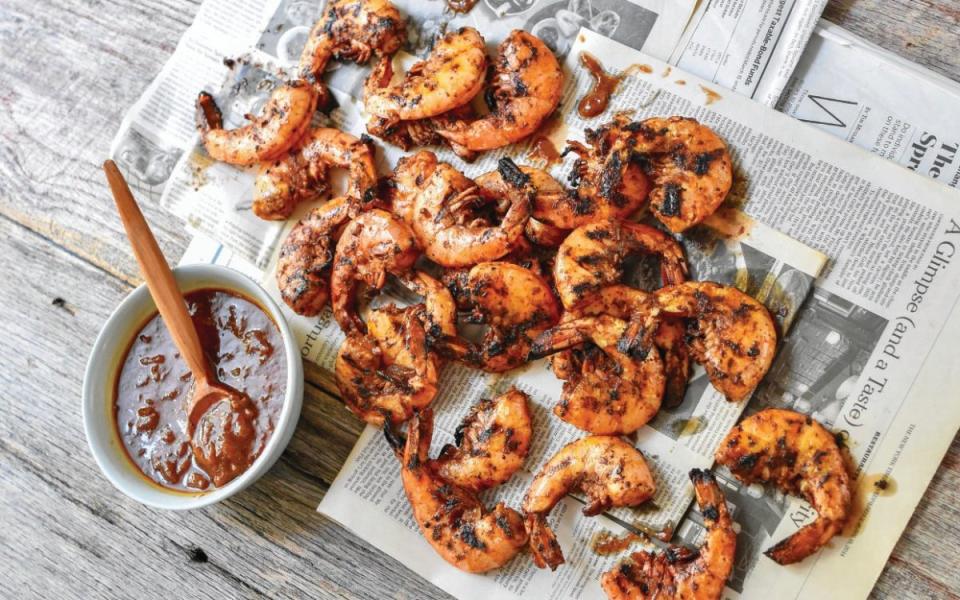
Teresa Blackburn
In this Creole recipe, Al Roker gives a dish traditionally done in a skillet on the stove-top a summertime spin by marinating shell-on shrimp in the rich, buttery sauce before placing it directly on the grill.
Get the recipe: Al Roker's New Orleans-Style Grilled Shrimp
Related: Al Roker's Spicy Chicken Wings Are So Good, You'll Want to Make Them Every Week
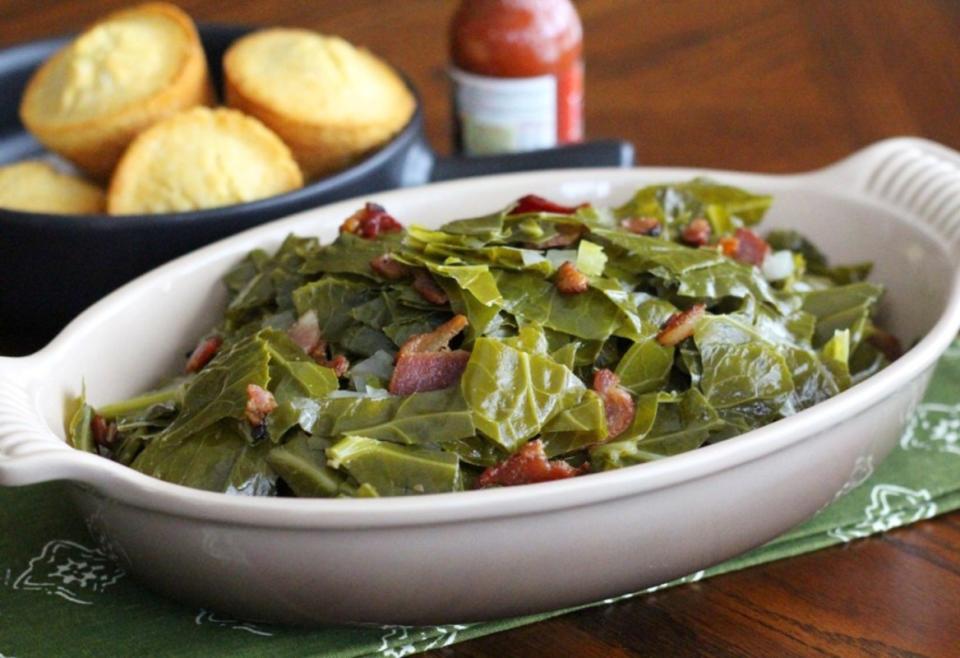
Melissa Sperka
Collard greens are a beloved traditional Southern side dish. They’re typically made with smoked meat, such as ham hocks, making them both flavorful and inexpensive to serve. Try this version with a Cajun twist using thick-cut bacon to add the smoky flavor.
Get the recipe: Cajun Collard Greens with Bacon
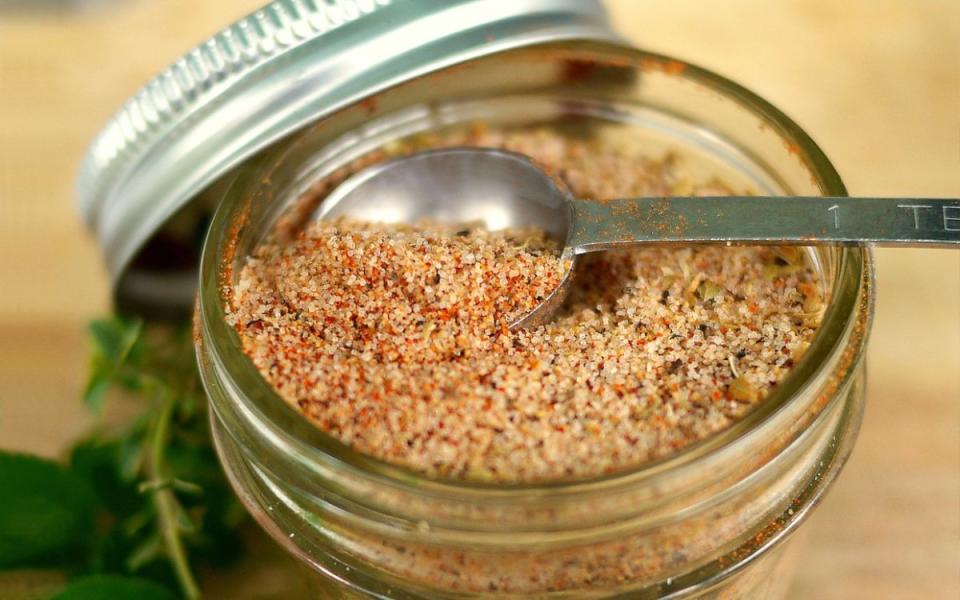
Parade
Most supermarkets carry Cajun– or Creole-style seasoning (try Zatarain’s), but making your own lets you control the salt.
Get the recipe: Creole Seasoning

Parade
A delicious twist on a classic New-Orleans style barbecue shrimp recipe!
Get the recipe: Ginger-Scented Shrimp

Guy Fieri
In his cookbook and grilling guide, Guy on Fire, Guy Fier shares this deliciously flavorful pork loin recipe. Guy says: “If you want to add great flavor to a pork loin, brine it. If you want to add super flavor to your pork loin, stuff it with your favorite Cajun-country sausage. This recipe is worth all the effort.”
Get the recipe: Guy Fieri's Andouille-Stuffed Pork Loin with Creole Mustard
Related: 65 Best Grilled Pork Recipes

Parade
New Orleans restaurant Antoine’s is celebrating its 175th anniversary this year. Here are three cocktail standbys served at the historic French Quarter restaurant, which is still working on renovations to restore damage caused by Hurricane Katrina a decade ago.
Get the recipe: Creole Cocktail Hour

Grandbaby Cakes
This BEST Red Beans and Rice Recipe is the Ultimate Cajun favorite done right! Insanely flavorful kidney beans with a hint of spice and meaty essence are served over white rice for the perfect Southern Creole recipe.
Get the recipe: The Best Red Beans and Rice Recipe

Grandbaby Cakes
In this classic Bananas Foster recipe, sliced bananas are coated in a cinnamon caramel sauce, then flambeed in rum and banana liqueur to create the sweet treat of your dreams! Did I mention it’s served over a heaping scoop of vanilla ice cream?
Get the recipe: Bananas Foster
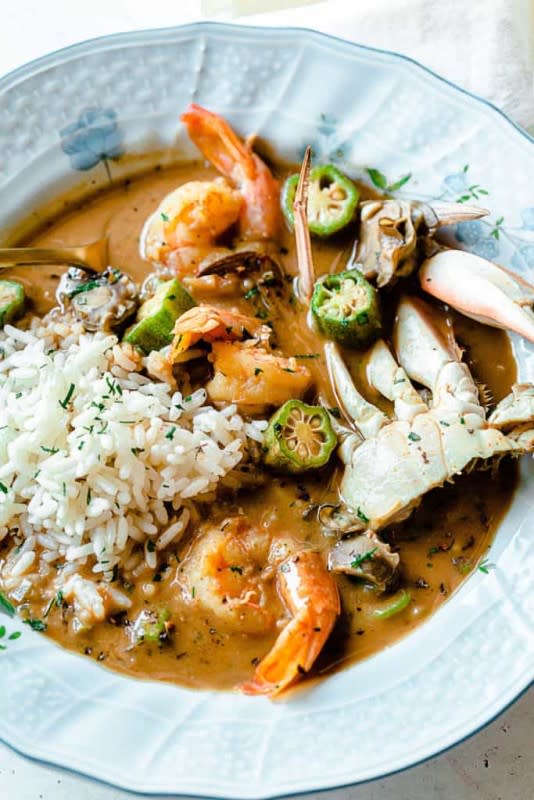
Grandbaby Cakes
This generations-old Seafood Gumbo Recipe is chock-full of tender shrimp, oysters and crab meat swimming in a spiced broth that began with a deep roux.
Get the recipe: Seafood Gumbo Recipe
Related: 111 Greatest Shrimp Recipe Hits

Grandbaby Cakes
Crispy Cajun fried shrimp are piled on a French baguette and topped with a Creole-inspired creamy remoulade sauce, creating the most delicious and authentic po'boy you will ever taste outside of NOLA!
Get the recipe: Authentic New Orleans Shrimp Po' Boy with Creole Remoulade Sauce

Black People's Recipes
This Black Folks Shrimp and Grits recipe is made with fluffy, creamy stone ground grits and served with Southern Creole seasoned gravy. Pair this soul food staple with any of your favorite seafood or shellfish.
Get the recipe: Black Folks Shrimp and Grits

Grandbaby Cakes
These New Orleans Beignets are the Real Deal! Heavenly morsels of dough are deep fried to golden brown perfection and topped with powdered sugar making you feel like you stepped off the plane into NOLA!
Get the recipe: New Orleans Beignets
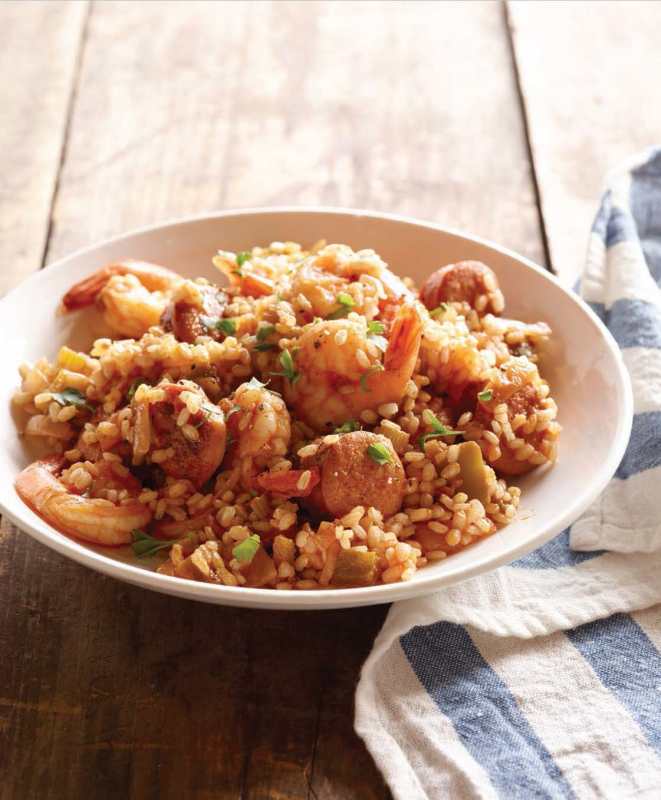
Matt Armendariz
Creole brown-rice Jambalaya with chicken, sausage, and shrimp from Laila Ali, who shares family recipes in her cookbook Food for Life.
Get the recipe: Louisiana-Style Jambalaya

Grandbaby Cakes
The New Orleans Hurricane Drink is the quintessential NOLA cocktail that always get the party started. Perfectly sweet, tropical, and highly addictive, they bring a little bit of The Big Easy right to your home.
Get the recipe: New Orleans Hurricane Drink
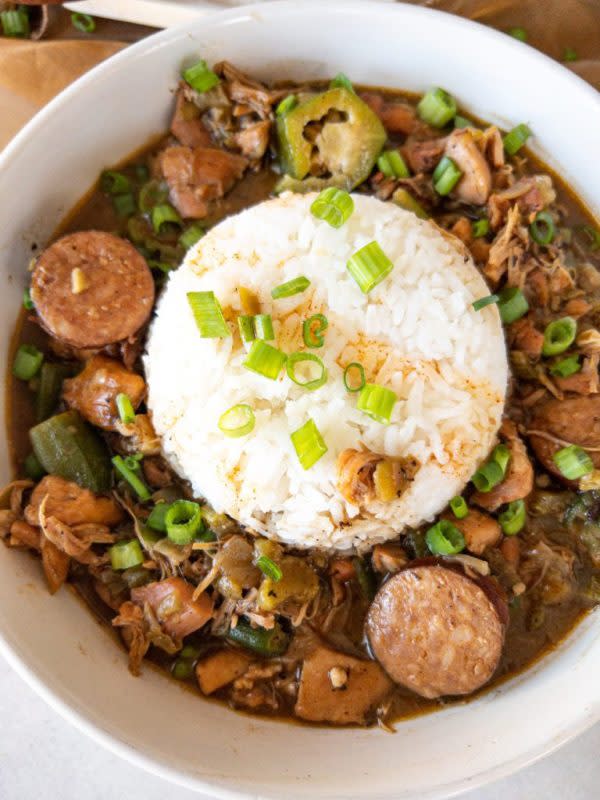
Razzle Dazzle Life
Chicken and Sausage Gumbo is a hearty bowl of comfort with juicy pieces of chicken, andouille sausage, and veggies swimming in homemade roux. You will definitely want seconds of this classic southern dish served with a scoop of white rice!
Get the recipe: Chicken and Sausage Gumbo
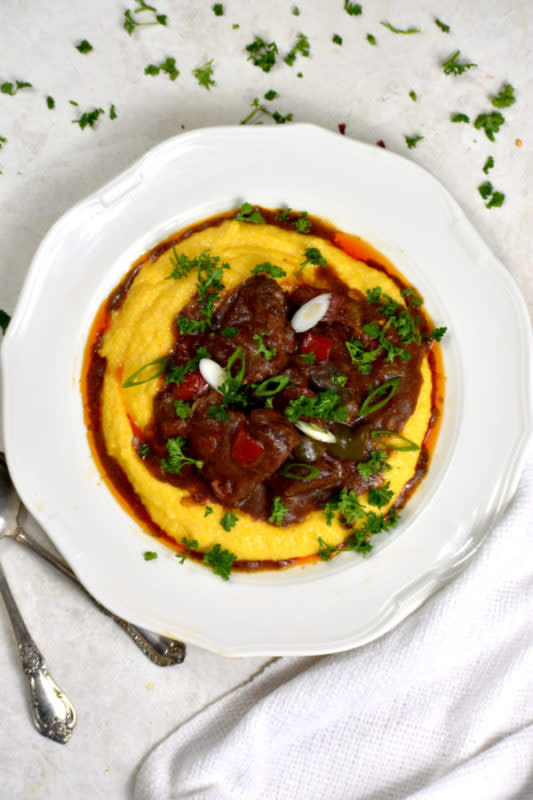
Gypsy Plate
Grillades 'n' Grits, a Creole classic. Tender medallions of meat simmered in a tomato based gravy over creamy, cheesy grits. You're in for a real treat with this one!
Get the recipe: Grillades 'n' Grits

Veggie Inspired
Packed with plant based protein, lots of veggies, and smoky flavor, this Vegan Jambalaya is hearty and comforting!
Get the recipe: Vegan Jambalaya
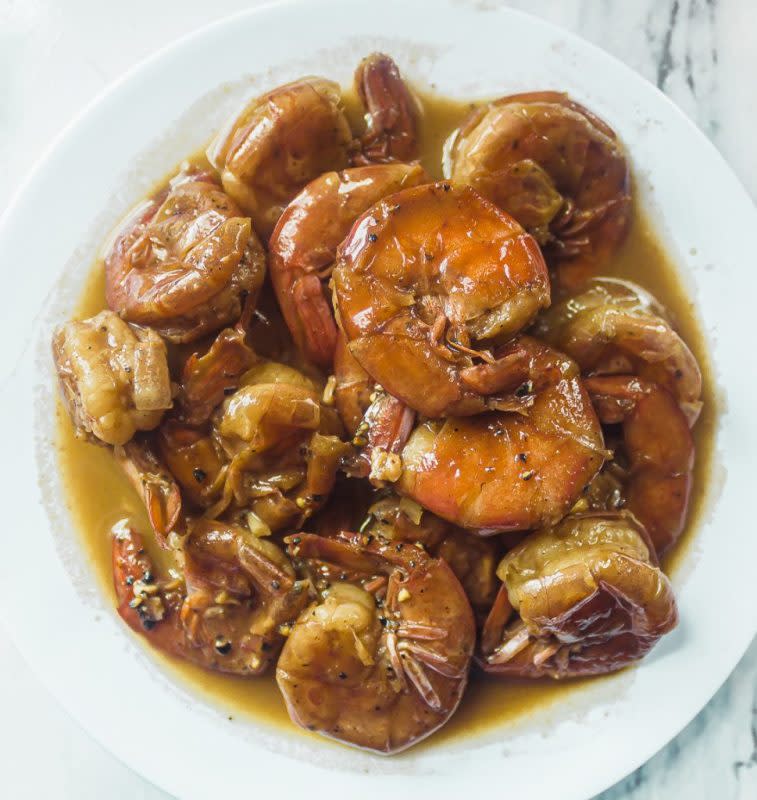
Chenée Today
This is the best New Orleans BBQ Shrimp with beer! The New Orleans BBQ shrimp sauce is so flavorful, buttery, and incredibly easy! You’ve got to try this Louisiana BBQ shrimp recipe!
Get the recipe: New Orleans-Style BBQ Shrimp

BellyFull
This Louisiana-style remoulade sauce recipe is Perfect for po’ boys, crab cakes, or an awesome dipping sauce for so many things. Whip up a homemade version in minutes!
Get the recipe: Remoulade Sauce

Collards Are The Old Kale
This Shrimp Po' Boy Salad takes the classic New Orleans sandwich but removes the complex carbs - perfect for a Mardi Gras party!
Get the recipe: Shrimp Po' Boy Salad

Dude That Cookz
Savory Creole Fish Etouffee (Stew) combines the creamy consistency of an etouffee with the vibrant flavors of a tomato-based Creole stew.
Get the recipe: Creole Fish Etouffée (Stew)

Bobbi's Kozy Kitchen
This Jambalaya Pasta with Crawfish and Sausage recipe gives you all of the authentic flavors of your New Orlean's fave, all wrapped in a cheesy pasta dish.
Get the recipe: Jambalaya Pasta with Crawfish and Sausage
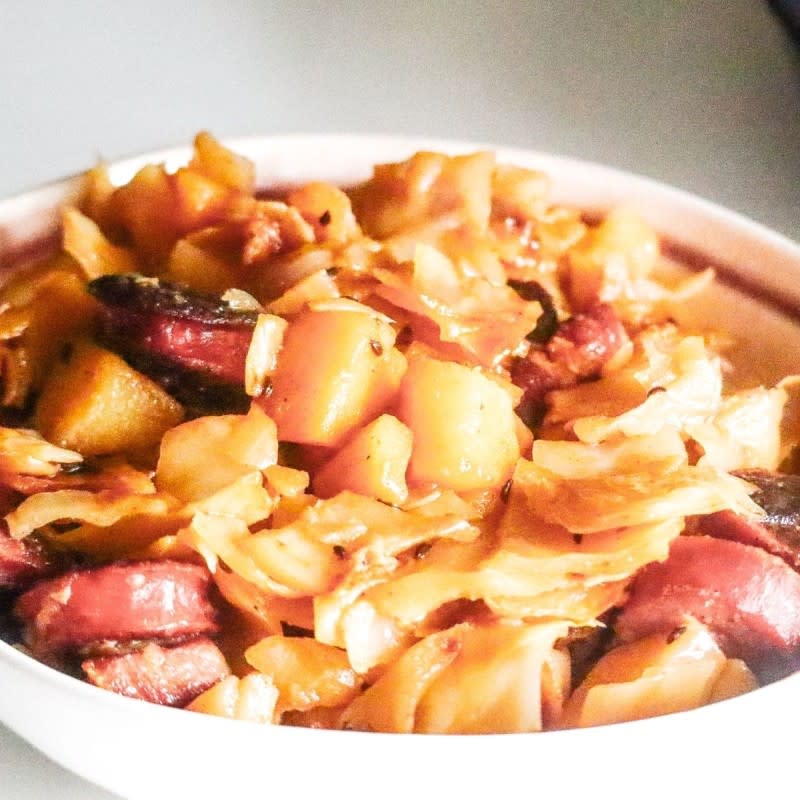
We Eat At Last
Delicious Creole-spiced cabbage smothered with garlic, bacon, potatoes and sausage. This recipe is easy to make, paleo-friendly, and can be served with just about anything!
Get the recipe: Smothered Cabbage

Healing Tomato
Easy-to-make peas and potatoes in the Dutch oven, using homemade Creole seasoning!
Get the recipe: Creole Potatoes
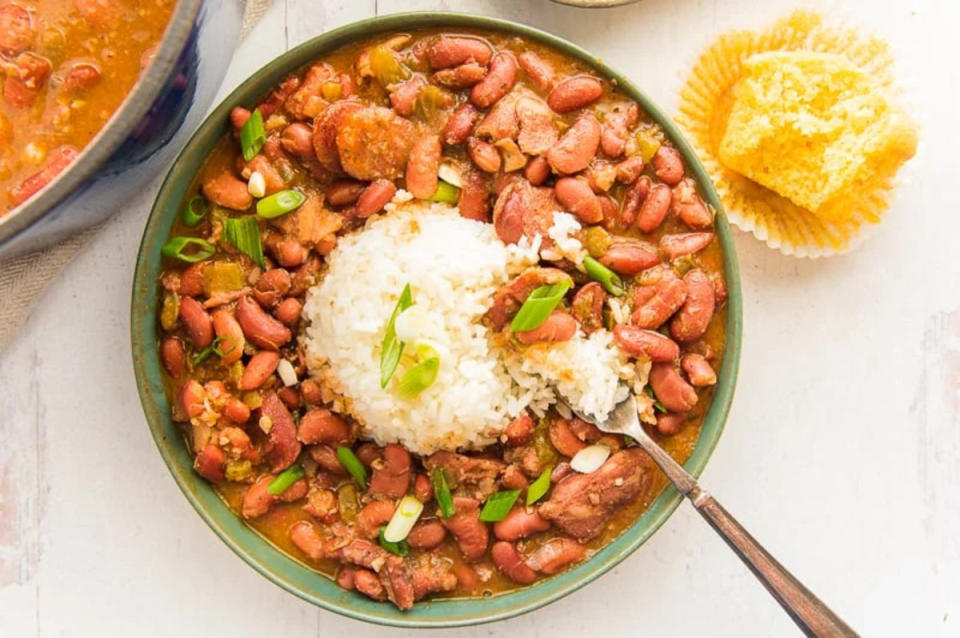
Sense and Edibility
Creole Red Beans and Rice are a meal on their own. Savory beans are flavored with andouille sausage and bacon, and, of course, the Trinity.
Get the recipe: Creole Red Beans and Rice with Andouille Sausage

Food Is Love Made Edible
At many of the higher end restaurants in New Orleans you’ll find BBQ fish on the half shell on the menu. The best ring about it? You can prep this dish, wrap it in foil stuff it in a cooler, and then while you’re on a parade route throw the fish on the grill just like you would anything else.
Get the recipe: BBQ Redfish on the Half Shell

Mom Foodie
Simple blackened chicken is a delicious easy recipe. A great way to get Creole flavor without a lot of fuss.
Get the recipe: Blackened Chicken

Sims Home Kitchen
A low-carb Cajun Shrimp Fajita Pan with a spicy twist. This keto and paleo skillet meal includes creamy avocado chunks and tangy lime. And, it’s ready in under 30 minutes.
Get the recipe: Cajun Shrimp Fajita Pan Recipe
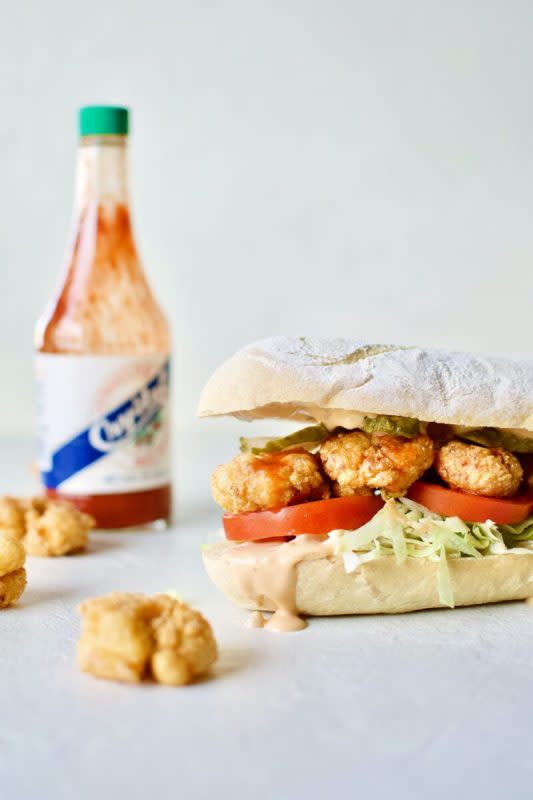
Kendell Kreations
This delightful sandwich will transport you to the Big Easy at first bite!
Get the recipe: Shrimp Po' Boy Sandwich
Related: 40 Best Slow Cooker Sandwich Recipes
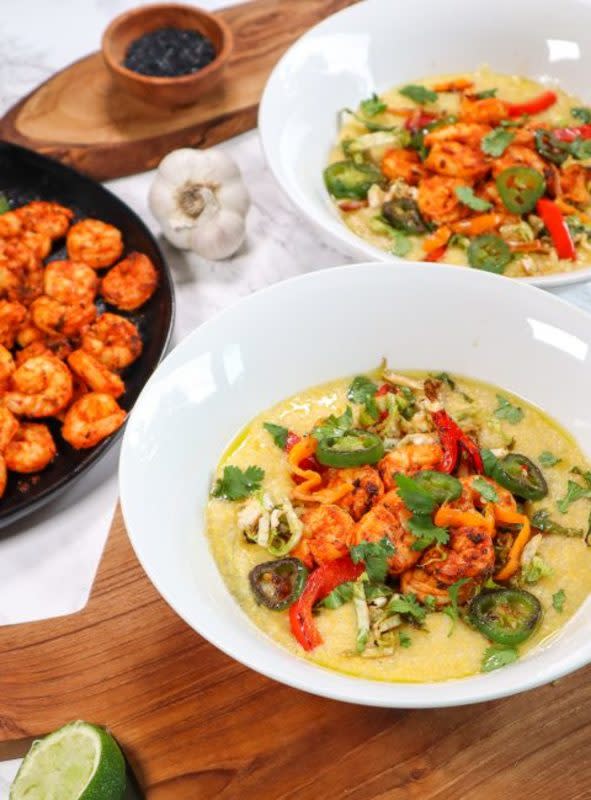
Good Food Baddie
Rich, creamy polenta topped with cajun shrimp and sautéed peppers! This incredibly flavorful dish is quick and easy to make! It’s perfect for a fancy at-home brunch, with bubbly and a few friends!
Get the recipe: Creamy Polenta with Cajun Shrimp

A Cedar Spoon
This Shrimp Creole Recipe is cooked in a foil packet with cajun spices, rice and vegetables. This is a quick easy weeknight meal with minimal cleanup. You will love this shrimp dish with that cajun kick!
Get the recipe: Shrimp Creole Recipe

Flavor Mosaic
Creole Green Beans are savory and spicy and delicious with bacon, onions, tomatoes, chilies, and cajun seasoning and make a perfect Cajun Side Dish for Mardi Gras or any time.
Get the recipe: Creole Green Beans
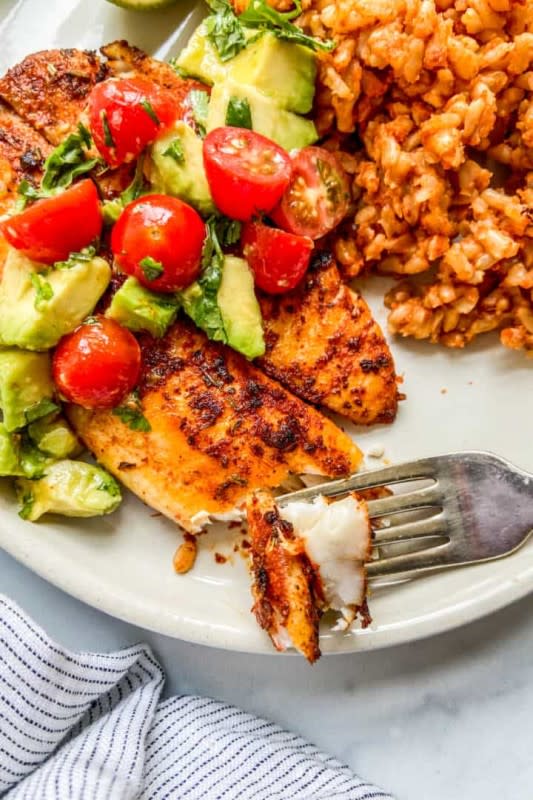
This Healthy Table
This spicy blackened tilapia recipe is ready in minutes! The seasoning and sautéing of this dish combine to make a delicious, tender fish.
Get the recipe: Blackened Tilapia

Craving Some Creativity
This pecan pralines recipe has been a loved family recipe for over 35 years. Whole snappy pecans in a browned sugar coating, these treats are a kind of cookie that is a classic in the south and, especially, New Orleans.
Get the recipe: New Orleans Pecan Pralines

Cooking & Cussing
Savory hand pies made with flaky crescent roll dough filled with a rich and meaty filling. These easy and quick pies are perfect football food but also make a standout weeknight dinner when paired with a simple salad.
Get the recipe: Louisiana Meat Pies

Call Me PMc
Creole 15 Bean Soup with Sausage and Ham is a spicy, comforting meal with Creole seasoned beans simmered slowly in a pot with sausage & ham.
Get the recipe: Creole 15-Bean Soup with Sausage and Ham

My Kitchen Serenity
These fried green tomatoes are topped with a creamy, spicy shrimp creole sauce. Full of flavor, this is a classic creole meal!
Get the recipe: Fried Green Tomatoes with Shrimp Creole Sauce
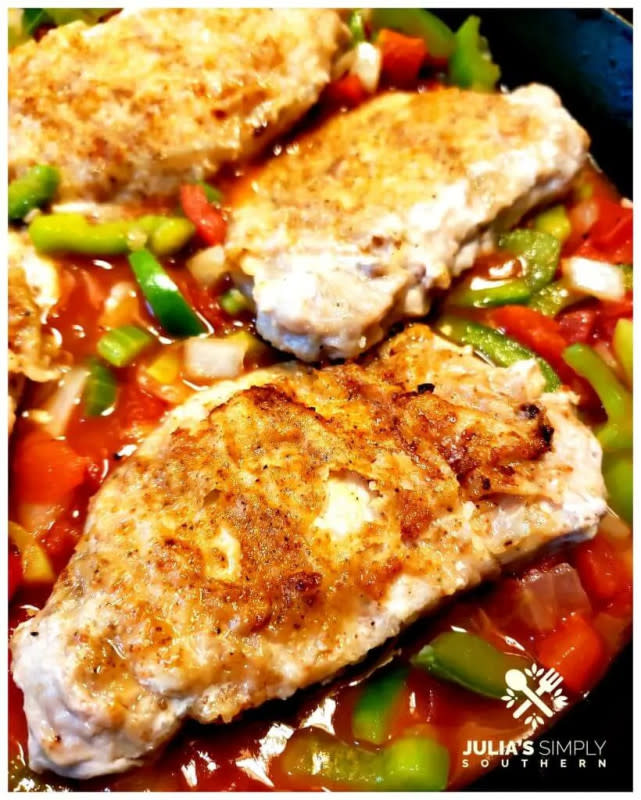
Julia's Simply Southern
Creole pork chops smothered in zesty seasoned vegetables and served over rice for a flavorful meal the whole family will love.
Get the recipe: Creole Pork Chops

Joyous Apron
An easy and yummy Cajun and Creole-inspired pasta with cream sauce and blackened shrimp with lots of bold flavors. Ready under 30 minutes!
Get the recipe: Blackened Shrimp Pasta
Related: 38 Best Instant Pot Pasta Recipes

Little Ferraro Kitchen
Inspired by a New Orleans favorite, these charbroiled oysters are cooked with paprika herb butter and topped with Parmesan cheese and lemon.
Get the recipe: Charbroiled Oysters with Garlic Butter and Parmesan

Best Appetizers
Inspired by the classic New Orleans Muffuletta Sandwich, this Baked Muffuletta Dip is cheesy, delicious and makes the perfect appetizer!
Get the recipe: Baked Muffuletta Dip

Dr. Davinah's Eats
Making Creole food does have to be complicated. Use a DIY Cajun seasoning and garlic butter to make fresh or frozen shrimp in less than 15 minutes.
Get the recipe: Air Fryer Cajun Shrimp

Babaganosh
This Instant Pot Sausage Jambalaya is loaded with Creole flavors and one of the most satisfying rice dishes out there. It's very easy to make in the Instant Pot!
Get the recipe: Instant Pot Sausage Jambalaya

Flipped Out Food
Make-Ahead Creole-Style Shrimp étouffée is easy to deliver on a weeknight—like Mardi Gras!—because you make the roux-based sauce in advance.
Get the recipe: Make-Ahead Creole Style Shrimp étouffée

Went Here 8 This
Smothered Okra and tomatoes is a thick and delicious southern style dish with lots of Cajun flavor. Serve it on its own or with rice for a comforting and filling meal!
Get the recipe: Smothered Okra and Tomatoes

Frugal Mom Eh!
This Cajun Chicken Alfredo Pasta Recipe is a spicy take on a creamy classic. The best of both worlds in one easy dish with Andouille sausage!
Get the recipe: Cajun Chicken Alfredo Pasta Recipe
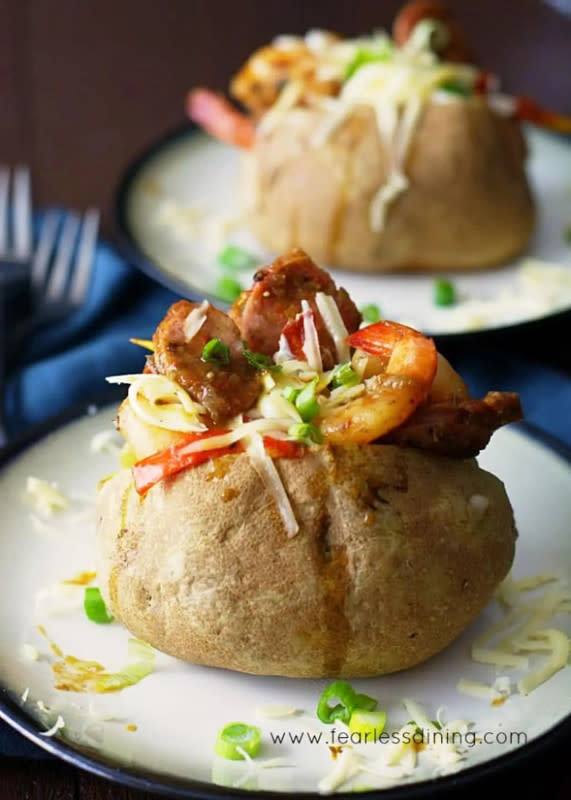
Fearless Dining
This spicy gluten free jambalaya recipe is a tasty dish to eat during Mardi Gras celebrations or any time! You can enjoy the jambalaya as is, or add it to baked potatoes for a fun twist on this spicy classic!
Get the recipe: Mardi Gras Jambalaya Stuffed Baked Potatoes

Southern Bytes
Creole Seafood Gumbo is rich, delicious, and so hearty. It is a bowl of New Orleans comfort that will take your taste buds on a trip to the Big Easy.
Get the recipe: Creole Seafood Gumbo Recipe
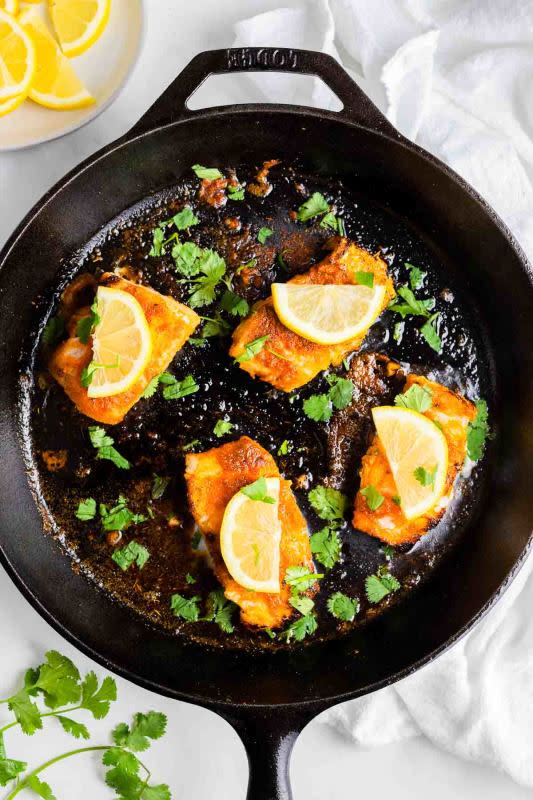
Peel with Zeal
Homemade Cajun seasoning is what makes this cod recipe so special. The right amount of spice for this traditional cooking method.
Get the recipe: Blackened Cod
Up next: 33 Asian-Inspired Chicken Recipes to Make for Dinner Tonight
